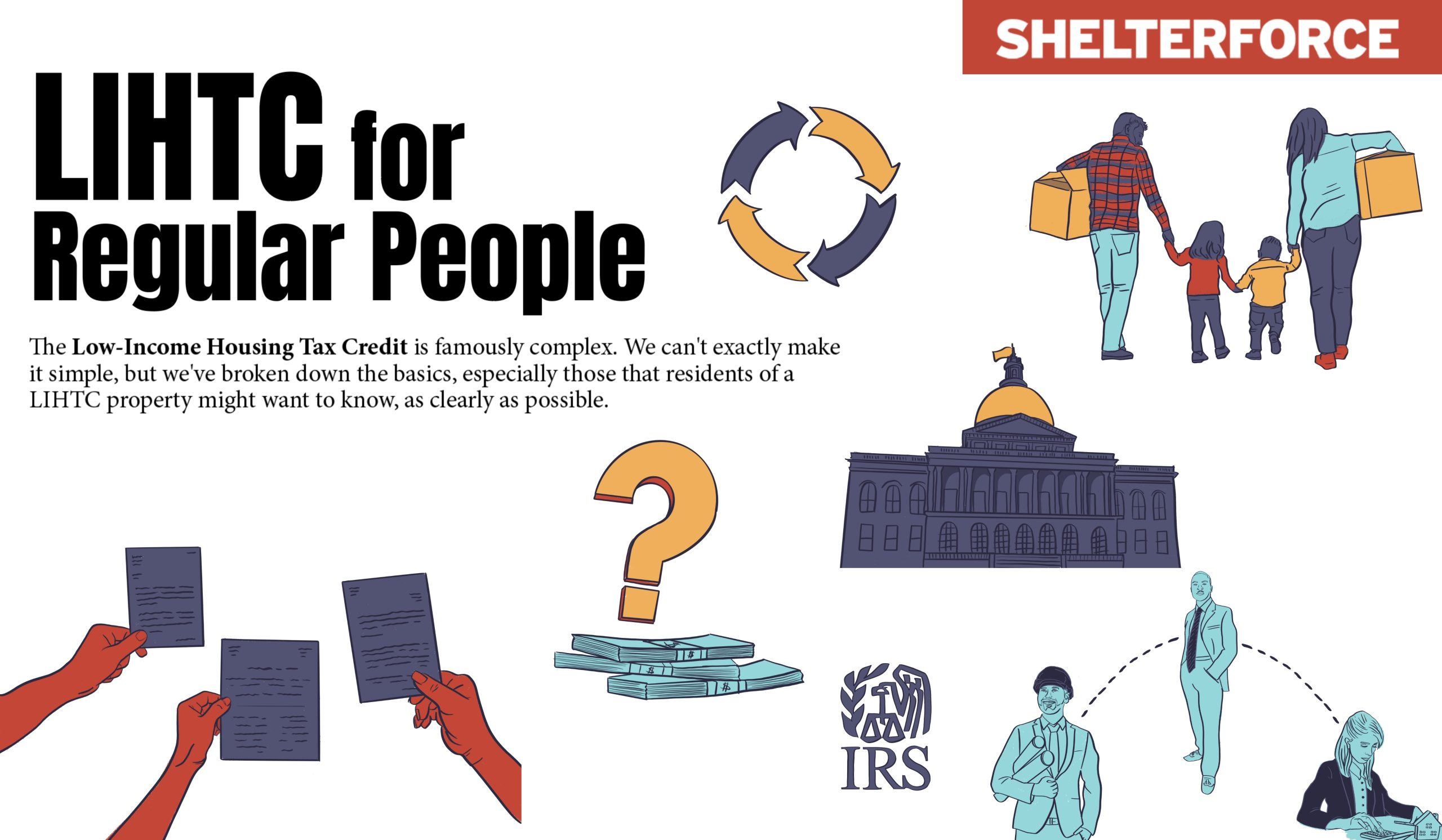This article is part of the Under the Lens series
LIHTC: The Good, the Bad, and the Very Complicated

Illustration by FangXiaNuo via iStock
Between 1987 and 2021, the public-private Low-Income Housing Tax Credit (LIHTC) program constructed 3.55 million housing units across the U.S. However, as covered in a previous Shelterforce article, legal loopholes have allowed predatory entities known as aggregators to hijack the program and use it to seize affordable housing from nonprofits and milk the housing for profit.
Three years later, the problem of aggregators still plagues the affordable housing industry.
“We’ve not seen any decrease [in aggregator activity],” says David Davenport, an attorney who specializes in litigation involving aggregators and represents nonprofit general partners. “If anything, we’ve seen an increase” in litigation, he says.
However, a recent court victory for a nonprofit developer over an aggregator, along with proposed legislation to clarify the right of first refusal, could help nonprofits fight back.
As a recap, the LIHTC program works like this: a low-income housing developer applies to a state housing credit agency for tax credits. A private investor, the limited partner, purchases the tax credits and funds the property. The developer, the general partner, oversees the daily maintenance and operations of the property.
The drafters of the program wanted to facilitate continual affordability of LIHTC properties by making it cheaper and easier for nonprofit general partners to maintain ownership. So Congress included a right of first refusal for nonprofit developers, meaning they can “buy out” the limited partner after 15 years.
However, in the past decade, a troubling trend has been popping up across the country. There are dozens of ongoing lawsuits where limited partners and predatory aggregators (third parties who buy out limited partners) are suing their own general partners, who are often nonprofit housing providers. These aggregators take advantage of ambiguous contract language to try to gain control of the properties.
“At last count, there are over 45 [ongoing] cases specifically focused on the nonprofit’s right of first refusal and challenges to language,” says Moha Thakur, the public policy and Mid-Atlantic initiatives manager at the National Housing Trust.
These cases are costly and take valuable time, diverting nonprofits from property maintenance and resident services. “All of that stuff gets pushed to one side because you just want to keep hold of the property to keep it affordable,” Thakur says.
Despite the continued onslaught of aggregator activity, there has been one promising judicial development.
On May 10, 2022, the Sixth Circuit Court of Appeals ruled in favor of the defendants, the nonprofit general partners, in SunAmerica Housing Fund v. Presbyterian Village North and its affiliates, the collective general partners in the partnership. Davenport represented the general partner defendants in this case.
Presbyterian Village North is a nonprofit provider of subsidized housing operating in Michigan. It was the general partner in a LIHTC deal with SunAmerica as the limited partner. Limited partners typically possess majority ownership of LIHTC developments. SunAmerica owned 99.99 percent of the partnership.
According to the rules of the limited partnership agreement, Presbyterian could not sell or dispose of the property without the consent of SunAmerica. There was, however, a right of first refusal available to Presbyterian to buy the property at a below-market rate if a third party made an offer to buy the property.
In 2019, the general partners received an offer to buy the property from The Michaels Organization, a real estate company that develops, constructs, and manages residential properties. PV North later contacted a separate company, Lockwood Development Company LLC. In the emails, the general partner described its worries that the first offer wouldn’t trigger the ROFR and implied its encouragement that Lockwood also make an offer.
When Presbyterian tried to exercise its right of first refusal, SunAmerica filed a lawsuit against the general partners. The district court initially ruled in favor of SunAmerica, saying that Lockwood’s offer wasn’t a bona fide offer to purchase and that there was no real intent to sell. Presbyterian appealed the decision, however, and the appellate court reversed it.
The court opinion considered the context of the LIHTC program, its stated goals, and how it functions. What rational third party would ever seriously put in an offer for the property knowing that the nonprofit would get to buy it anyway? “In these circumstances,” wrote Circuit Judge Jane B. Stranch, “soliciting an offer from a serious buyer that knew the ROFR-holder would exercise its right, as the General Partners did, may well be the only way to trigger the ROFR.”
The court also said that an “intent to sell” didn’t necessarily mean an intent to sell to the third party, just a general willingness to sell. Otherwise, “the Partnership knows that a bona fide offer would trigger the ROFR,” meaning that “the ROFR would paradoxically never be triggered,” the court said.
“In some sense, the two offers that they did receive—and the fact that they solicited at least one of those—would seem to suggest the opposite: they did intend to sell or entertain third-party offers,” Judge Stranch wrote before ending the opinion by reversing the district court’s decision.
Aggregators are still engaging in predatory lawsuits, but these legal victories are “a very powerful tool for nonprofits to point to and direct other courts to, helping them reach the right decision in more cases,” says Davenport.
Additionally, legislation has been introduced and is being reviewed by the Senate Finance Committee that would clarify the conditions for the exercise of the right of first refusal. The 2023 Decent, Affordable, Safe Housing for All Act, or DASH Act, would specifically allow the LIHTC ROFR to be “exercisable with or without the approval of any owner of the project (including any partner, member, or affiliated organization of such an owner).” It also states that the ROFR “shall be exercisable in response to any offer to purchase the property or all of the partnership interests, including an offer by a related party.”
The law would be retroactive, affecting not just new LIHTC deals, but existing ones as well. Such a law could help prevent costly litigation between LIHTC limited and general partners, at least those surrounding the right of first refusal.
What’s most important to Davenport is that housing providers pay attention to this issue and stay educated. “Don’t approach this in a haphazard way thinking that your partner has the same objectives as you do. I still see people getting taken advantage of a lot,” he says. “Talk about what’s going on. Reach out to your housing authority and say, ‘hey, this doesn’t really feel right.’ Don’t go it alone.”
|
Now through Dec. 31, all donations to Shelterforce will be matched. Double the impact of your donation by supporting our work today. |






Comments